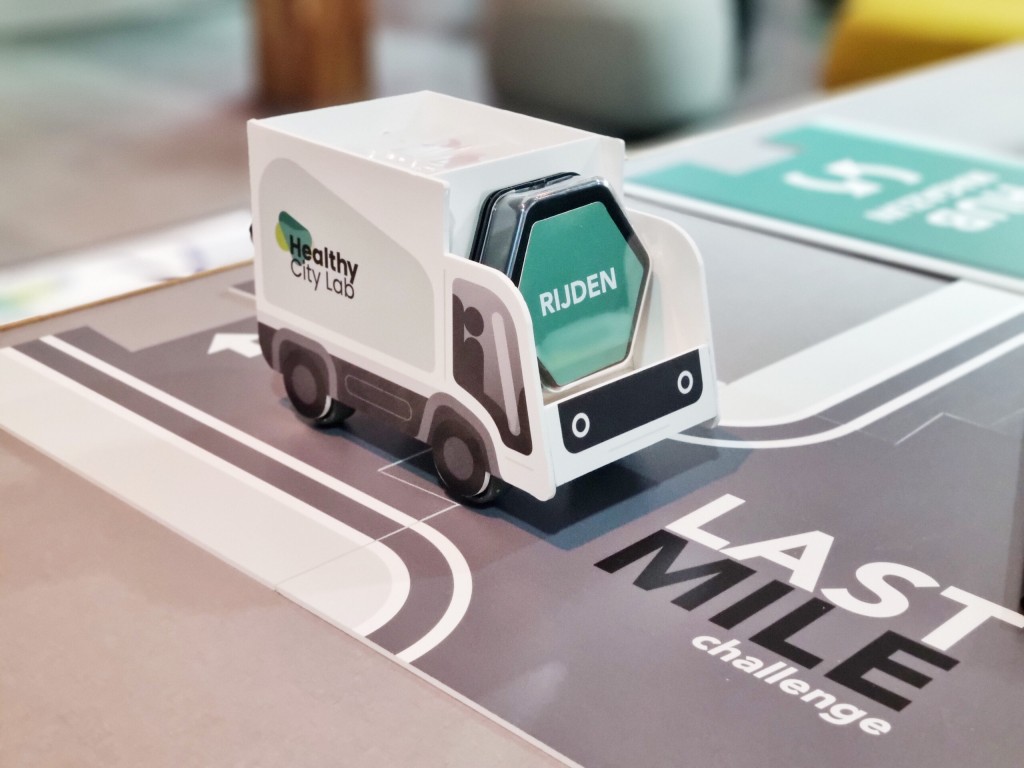The Last Mile Challenge: Playful approach to Sustainable Urban Logistics

Urban logistics faces major challenges. How do you ensure that goods reach their final destination on time, sustainably and at acceptable costs in densely populated areas? Zero emission zones are being introduced in cities, congestion is increasing and customer expectations continue to rise. The "last mile" - the last piece of the logistics process - often turns out to be the biggest bottleneck. Traditional solutions focus on costs and efficiency, but sometimes disregard sustainability goals and the complexity of cooperation between different stakeholders.
The Logistics and Alliances lectorate at HAN University of Applied Sciences has found a creative and innovative way to tackle this challenge: The Last Mile Challenge, a serious game that not only imparts knowledge, but also encourages behavioural change. In a realistic simulation, participants crawl into the role of different links in the logistics chain. The goal? Creating awareness of the impact of their choices, promoting cooperation and gaining insights into new concepts to make the last mile more sustainable and efficient.
Why a serious game?
Last-mile logistics is complex. It is not just about the delivery of goods; numerous factors such as road safety, CO2 emissions and the interests of different parties come into play. The biggest problem? Often, stakeholders do not work well together or their interests are not aligned. The game exposes exactly these pain points by letting players experiment with solutions such as hubs, bundling deliveries and using cleaner vehicles.
The power of serious gaming lies in the combination of learning by doing and immediately understanding the consequences of decisions. In the Last Mile Challenge, for example, you see how using a hub can improve efficiency, but also what compromises are needed in the process. How do you optimise logistics without sacrificing sustainability or costs? By working together and thinking from different perspectives, participants come to insights that are difficult to convey in a traditional course or training.
https://youtu.be/wK6VQgkgRbc
What to expect?
The article details the design and results of the Last Mile Challenge. Some highlights include:
Chain awareness as key: The game emphasises that everyone in the chain - from buyer to transporter - is responsible for the success of the last mile. Only by working well together can logistics become more efficient and sustainable.
Smart bundling and hubs: One of the most effective strategies in the game appears to be the use of urban hubs, where deliveries are bundled before going into the city. This not only reduces traffic and emissions, but also provides cost savings.
Learning effect and practical application: The game makes the effects of choices visible, leading to valuable discussions and insights. In the afterthought, the lessons from the game are directly translated to daily practice, giving participants tools to apply what they have learned.
A must-read for logistics professionals and policymakers
The article concludes with an outlook on how the Last Mile Challenge is being deployed at companies and educational institutions. Especially in urban areas where sustainability is becoming an increasing priority, it is crucial to optimise supply chain processes. Not only logistics professionals, but also decision-makers such as buyers and managers can benefit from the insights provided by the game.
Wondering how exactly the Last Mile Challenge works and what it can do for your organisation? Read the full article and discover how this serious game can transform the future of urban logistics.
Read the full article here
SSCMH (Sustainable Supply Chain Management in Healthcare)
This game was developed within the SSCMH (Sustainable Supply Chain Management in Healthcare) project of TKI Dinalog, the top consortium for knowledge and innovation in logistics. This programme supports innovative initiatives that contribute to smart and sustainable logistics solutions for the future.



